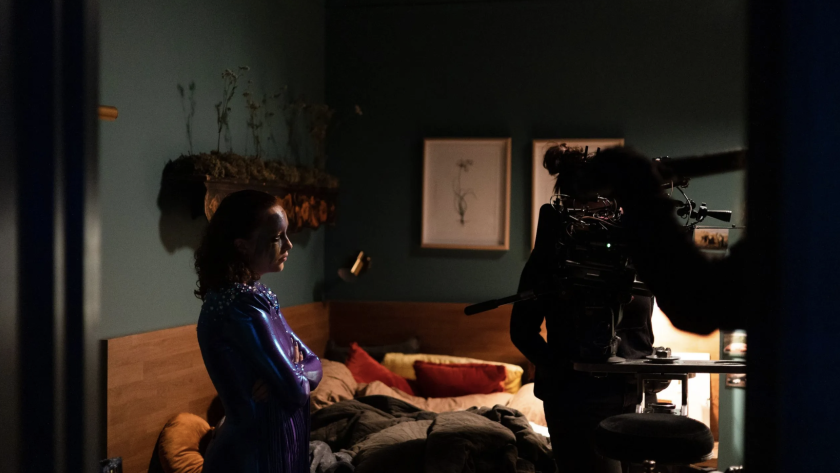Mayra Nassef, FilmSoc Journal’s International Film Festival Rotterdam correspondent, interviews Helena Stefánsdottir, Icelandic director of Bon Appetit (2011) and her new feature Natatorium (2024).
“Natatorium” by Helena Stefánsdottir is a psychological thriller that follows 18-year-old Lilja’s visit to her grandparents’ house – whom she has not seen for a long time – for auditions. During her stay, she starts to uncover dark mysteries that lie within the household. The title “Natatorium” refers to the swimming pool that is central to the film. The film was screened as part of International Film Festival Rotterdam 2024 (IFFR), and I got the chance to briefly chat to the Icelandic director about her debut feature.
The film’s screenings were sold out, something that Stefánsdottir noted, commenting on how IFFR’s environment has been supremely positive, and that people were asking “intelligent and emotional questions” in response to the film. She recalls that after watching the film, she felt a bit worried due to a certain “imposter syndrome”, but can now firmly say she is proud of it. While it is her first officially known feature film, over the years Stefánsdottir has made quite a number of short films including ones in 2007 (Anna) and 2011 (Bon Appétit).
Commenting on the venture into feature-length territory as part of her filmmaker journey, she shares her growth from 2000 – almost 7 short films later. However, the approach to a feature is wholly different. Stefánsdottir describes feature lengths as having a much “longer” process than a short film, with it also being “hard to finance” and much bigger in scope. “Keeping someone in the cinema for 15 minutes is much easier than an hour and a half”. Every type of medium has its own affordances. “A short film is like a poem, it’s its own thing”. Despite the differences in mediums, Stefánsdottir has a specific style – one that blurs lines between reality and fiction, and one which she is indeed quite comfortable. Whilst “sticking to her genre”, she is keen to find room to “mature” her cinematic canvas. The current story she is working on is again family-oriented, although it ventures beyond the single household location of “Natatorium”.
Before anything, the first thing to come are “visions of scenes”. With Natatorium, she recalls visualising the dinner scene at the end, one of the most memorable parts of the film. “It’s almost always images at the beginning”. After visualising these “images” such as with the family dinner scene, she would gradually “make characters” out of that set-piece. Within those visions was the house that most of the film would go on to take place in, and where space for “choreographed” camera work would be essential to bringing the imaginary to life. The spirit of the film is “beauty in everything”, Stefánsdottir notes, commenting on her own spirituality, though not technically being “religious” she has a “respect for something higher than myself”. We witness this “respect” in front of her camera, where dogmas are shown to lose their spirituality if overly ritualised to a public.
When it came to casting, the director was heavily involved. She would meet the actors in person after seeing a lot of portraits referred to her by the casting director – it was after these meeting she would immediately know: “there’s a spark between me and the person, in addition to of course their acting as well”. She likes to rehearse a lot with each actor then with different pairings, practicing dialogue together, a preference aided by the fact that the “budget for rehearsals was quite good!”. Through rehearsals actors are able to hone in on the importance of “acting on the inside” and not the “outside”.
“I learned so much – I got so much bigger”. Stefánsdottir’s enchantment with the world grew as part of this film, and she became much more “assured” of herself. “My self-esteem has grown”. Working with other people is something she also hopes to do more of in the future. “It’s hard to be alone a lot”, writing on her own can be challenging, but in a collaborative sphere she describes it as being quite rewarding.
“I feel I have a huge responsibility”, Stefánsdottir comments on her status as a female filmmaker. “I want to encourage other women”. Giving advice to scriptwriters, she notes “stay true to yourself”, select your advice, and always keep your first drafts. “Never throw them away”.




